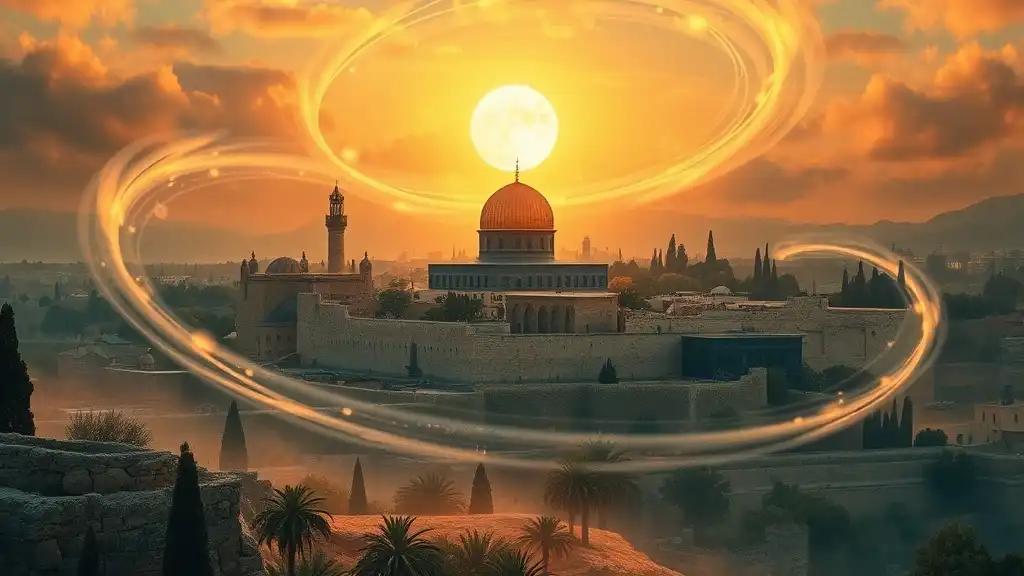Jerusalem is a city that resonates with spiritual significance across various traditions, making it a unique crossroads for faith, history, and culture. Its storied past intertwines with profound religious narratives, drawing millions of pilgrims and seekers from around the globe. Understanding the spiritual meaning of Jerusalem requires an exploration of its multifaceted identity as a sacred space for Judaism, Christianity, and Islam.
Jerusalem: A Sacred City for Many Faiths
Jerusalem holds a remarkable place in the hearts of followers of major religions—Judaism, Christianity, and Islam—serving as a focal point for worship and spiritual reflection.
Overview of Major Religions
Each religion binds its followers to Jerusalem through unique historical events and revered sites. For Jews, it represents the center of divine presence, for Christians, it is the site of Jesus's ultimate sacrifice and resurrection, and for Muslims, it is intricately linked to the Prophet Muhammad's Night Journey.
A Historical Context
Jerusalem's history is rich and complex. Throughout the ages, it has witnessed numerous conquests, destructions, and rebuildings. These historical narratives shape the spiritual significance that adherents feel towards the city. From the days of King David establishing Jerusalem as the capital of Israel to the Roman destruction that led to the diaspora, each event has left an indelible mark on the spiritual landscape of the city.

The Spiritual Significance in Judaism
The Temple Mount
At the heart of Jewish spirituality lies the Temple Mount. This site is revered as the location of the First and Second Temples, where offerings were made and sacrifices to God were performed. It symbolizes the direct link between the Jewish people and God, embodying the highest aspirations of faith and worship. The Temple Mount is not simply a location; it represents the sacred covenant between God and Israel, echoing the most profound longings of the Jewish soul.
The Western Wall
Adjacent to the Temple Mount is the Western Wall, a remnant of the Second Temple, considered the most sacred site where Jews can pray. Many congregate here, leaving written prayers tucked into the crevices of the wall. The experience of standing before this ancient stone is transformative, fostering a deep sense of connection to God and the Jewish heritage. It is a place of reflection, renewal, and hope, becoming a symbol of resilience and faith.

The Spiritual Significance in Christianity
The Holy Sepulchre
For Christians, the Church of the Holy Sepulchre holds paramount significance. It is believed to stand on the site of both the crucifixion and resurrection of Jesus Christ. Pilgrims visit this sacred space to engage with one of the central events of their faith, fostering a profound sense of spiritual intimacy. The atmosphere within the church—the flickering candles, the incense, the reverent whispers—creates a sort of sacred silence that invites deep contemplation and prayer.
Pilgrimages to Jerusalem
Historically, Jerusalem has served as a pilgrimage destination for Christians since the earliest days of the faith. These pilgrimages symbolize the journey of the soul towards redemption and enlightenment. Today, millions of pilgrims embark on this journey, seeking personal connection, renewal, and affirmation of their faith. Engaging with the city’s historical narratives during these pilgrimages enriches their spiritual experience, breathing new life into ancient teachings.

The Spiritual Significance in Islam
Al-Aqsa Mosque
For Muslims, Al-Aqsa Mosque is the third holiest site in Islam, second only to the Masjid al-Haram in Mecca and the Mosque of the Prophet in Medina. The mosque is situated on the Temple Mount, where it holds great significance in Islamic theology. The mosque stands as a symbol of faith and devotion, marking the site of the Prophet Muhammad's Night Journey, wherein he ascended to the heavens. This event is a testament to the spiritual elevation available to believers and serves as a profound source of inspiration for Muslim practitioners around the world.
Connections to Other Islamic Holy Sites
Beyond its connection to Al-Aqsa, Jerusalem plays a vital role in the spiritual narrative woven throughout the Quran. The city serves as a geographic and spiritual anchor, fostering unity among Muslims globally. As such, it serves as an essential backdrop for understanding one's place in the divine narrative.

Jerusalem as a Symbol of Peace and Conflict
Historical Conflicts
The city's history is not only marked by religious significance but also by conflicts that have challenged its sacredness. Jerusalem has been a battleground for various empires, each leaving their mark on its physical and spiritual landscape. These historical conflicts reveal the complex tapestry of faith and human endeavor, making Jerusalem a symbol of both division and unity.
Modern-Day Perceptions
In contemporary times, Jerusalem remains at the heart of spiritual dialogues that seek to bridge understanding among faiths. Many spiritual leaders and interfaith organizations strive to foster dialogue and understanding in a city that has often symbolized division. The hope for peace and unity amidst diversity continues to inspire many who are drawn not just to its stones but to its souls.

Personal Reflection and Spiritual Connection
Visiting Jerusalem
For spiritual seekers, a visit to Jerusalem can be a transformative experience. It offers opportunities for personal reflection, culminating in a poignant appreciation of the city’s rich history. Walking through its ancient streets, engaging with its diverse cultures, and visiting sacred sites can foster a deeper spiritual connection. Travelers often find themselves inspired to broaden their understanding of faith, history, and the divine.
Meditation and Reflection
In the spirit of personal exploration, various meditative practices can be employed while visiting Jerusalem. Quiet moments at the Western Wall or meditative walks through the Old City can provide seekers with the opportunity to connect with their own spirituality. Setting a personal intention for what one hopes to gain—whether clarity, healing, or understanding—can enhance this connection, making it a profound spiritual journey.

Conclusion
Jerusalem stands as a testament to the diverse spiritual narratives that intertwine across cultures and faiths. Its rich history, revered sites, and spiritual significance remind us of our shared humanity and the quest for meaning in life. In embracing this sacred city, we invite unity and understanding amidst our diverse paths, inspiring myriad souls to seek peace and connection through their faith.



















